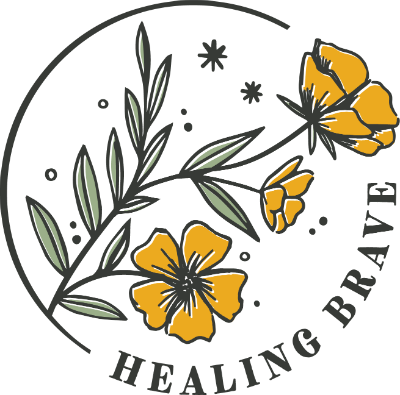Healing a Broken Heart Requires Intense Presence

Why is it that you'd console a baby when it cries yet you don’t show yourself the same quality of compassion? What changed? Where's the arbitrary line we draw that forces us into an adulthood that leaves no room for this kind of... presence? You don’t need a textbook on healing a broken heart, just some attention — maybe, a lot of it.
“The most important ingredient in resolution is becoming aware of where we are. It is essentially the most intense, unconditional presence.” — Teal Swan
Bottom line is this: if you feel terrible, you need to feel terrible. You don't need to feel better right away.
If you don’t acknowledge what hurts, meeting yourself where you’re at before you move forward, that suffering part of you stays stuck and doesn't move forward with the rest of you.
And if you’ve ever had your heart broken and haven’t dealt with it, you know that the pain comes out sideways later on down the line.
The popular phrase you have to feel it to heal it is true.
You have to be acutely attentive to those acutely painful feelings if you’re going to move forward. Accepting yourself first, before trying to feel better, is the seed of self-love and self-trust that blooms later on.
Healing a broken heart only happens when you pay it attention.
When you're in pain, you need a resolution of some kind. That requires an intense amount of presence.
Of course, it's easy *not* to deal with discomfort.
But distraction doesn't just keep you from feeling the pain; it keeps you from healing.
Work, parties, drinks, someone else, gossip, traveling... these distractions can be helpful if you’re not ready to deal with the immediate pain, but they ultimately don’t serve your healing. Not in the long run.
We wish we could move forward.
So, why do we get so stuck? Why does the trauma stay with us, maybe years or decades later? Maybe, it has something to do with *us* not staying with *it*.
For example, if someone you love dies and your friends try to get you to go out and have fun, you wish you wanted to go, but not all of you is on board. There’s an aspect of you that can’t be on board because you need some form of resolution, first, to move forward.
You wish you could move forward, but there's resistance. And if part of you can’t move forward, you’re not bringing your whole self forward when you decide to move. Something's left behind, and that gap widens each time you opt not to address it.
Don't ignore the part of you that isn't ready for change; that part has something it still needs to show you.
Try treating a broken heart like you would a child.
When you’re hurting, try to be with yourself. Be with that hurting. Sit with yourself and notice what you’re feeling and the thoughts you’ve been thinking. If you don’t do that, you create a gap between the different aspects of yourself.
And that’s what trauma is partly about — that gap. That gap between who you were and who you are and who you're becoming.
When an adult silences a child’s emotions, there's no opportunity for resolution. There’s that gap. An aspect of that child never moves forward and remains stuck at that age, even as they grow into an adult.
Just like the childish aspects of ourselves can't grow up if we don’t give them an opportunity to resolve, the aspects of ourselves that suffer can't heal if we don’t give them our unconditional, unwavering presence.
What if you treated your broken heart like it was a child? You console it. You don’t leave it alone. You don’t need to force a change, just hear it out. Give it time. Give it unhurried presence.
Being with someone regardless of where they are emotionally is a spiritual practice, a ministry of presence. It's how we help each other heal.
All that’s required of you is that you stay and not turn away.
When you feel intense emotion, do you banish it, and thus abandon part of yourself? Even more, do you beat yourself up for what you’re experiencing? Can you see how staying with yourself might close that gap and allow for more... wholeness?
You don’t need to do anything. It’s your task only to sit, stay, and be conscious of what’s happening.
You might say to yourself, “Oh, your heart is broken and that's seriously understandable.” Or, “I’m going to sit with this depression until I feel like my depressed aspect has a little bit of relief, so it can move forward with the rest of me.”
This is the beginning of self-love and self-trust: you bring all of your awareness and attention back here, to the truth of what you’re experiencing. You acknowledge it without berating it. You console it without forcing it to be different than what it is.
Things get broken. Things also mend, if given a chance.
Our wounds heal when we listen to what they have to say without requiring that they change their story.
Oh, and let me mention that moving forward does not mean moving on; it means moving in.
. . .
Tell me:
Which of these thoughts did you need today?
Tell me in the comments. I read every single one, and I’d love to know!
With love,
Jen
P.S. Honor your dark and your light. Get my book Sleep Rituals for 100 at-home practices that are all about you... being with you. It's more than a book about sleep. It'll help you heal all the fractured places within. So you can rest in love.




Comments on this post (2)
Jessica, you are right that healing does not end with simple attention, but it can start there. Everyone is different. I am no expert, just a fellow human who’s had their heart broken and is doing their best and who needs to write about it. I am sorry for the pain you’ve had to carry. I am still finding inspiration constantly in trying new things like meditation, tending to plants, yoga and community, talking about it, writing about it, picking up new hobbies and letting others go that don’t help anymore… this article is more for the starting phase of being willing to accept what’s in your heart in the first place so that you can address it in other ways that may or may not work for you. Everything is part of the process. There is no one answer for any of us. Being human is complex.
— Jennifer Williamson
What do you do when you’ve went in to the pain and are sitting with it and recognizing it and nothing still changes. Every single one of you say the same thing, there just seems to be no next steps. Article after article after article say exactly what you are saying. In fact, most of you should remove articles like this because all it does is make it hard for people to find something new when this doesn’t work. You say to go into the pain as if that will make it go away “all you have to do is not turn away.” That is not true, not turning away doesn’t make anything better.
— Jessica